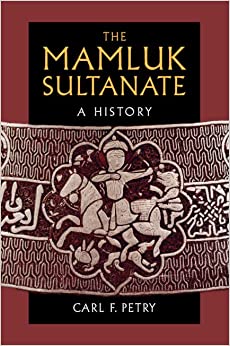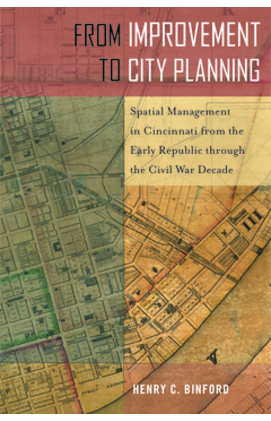Recent Faculty Books
Browse Our Faculty Books
2024
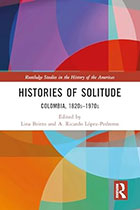 Histories of Solitude: Colombia, 1820s-1970s (Routledge, 2024). Edited by Lina Britto and Ricardo Lopez-Pedreros.
Histories of Solitude: Colombia, 1820s-1970s (Routledge, 2024). Edited by Lina Britto and Ricardo Lopez-Pedreros.
AND
Histories of Perplexity: Colombia, 1970s-2010s (Routledge, 2024). Edited by Lina Britto and Ricardo Lopez-Pedreros.
By combining chronological coverage, analytical breadth, and interdisciplinary approaches, these two volumes—Histories of Solitude and Histories of Perplexity—study the histories of Colombia over the past two centuries as illustrations of the histories of democracy across the Americas.
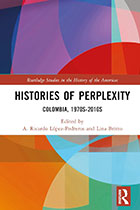
The volumes bring together over 40 scholars based in Colombia, the United States, England, and Canada working in various disciplines to discuss how a country that has been consistently presented as a rarity in Latin America provides critical examples to re-examine major historical problems: republicanism and liberalism; export economies and agrarian modernization; populism and cultural politics of state formation; revolutionary and counterinsurgent Cold War violence; neoliberal reforms and urban development; popular mobilization and counterhegemonic public spheres; political ecologies and environmental struggles; and labors of memory and the challenge of reconciliation. Contributors are sensitive to questions of subjectivity and discourse, observant of ethnographic details and micro-politics, and attuned to macro-perspectives such as transnational and global histories.
These volumes offer fresh perspectives on Colombia and will be of great value to those interested in Latin American and Caribbean history.
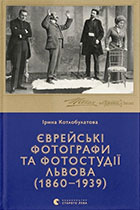 Jewish Photographers and Photo Studios in L’viv/Lwow/Lemberg, 1860-1939 (L’viv: The Old Lion Publ., 2024), in press [in Ukrainian, English annotation], Editor of Iryna Kotlobulatova, Yohanan Petrovsky-Shtern.
Jewish Photographers and Photo Studios in L’viv/Lwow/Lemberg, 1860-1939 (L’viv: The Old Lion Publ., 2024), in press [in Ukrainian, English annotation], Editor of Iryna Kotlobulatova, Yohanan Petrovsky-Shtern.
The monograph is dedicated to the history of Jewish photographers and photo studios in Lviv from 1850 to 1939. To this day, quite a few fundamental materials and documents on this topic have been preserved. However, the art collections of Lviv museums, as well as an array of photographs of Jewish (and not only) subjects, scattered in museum, library and private collections, give scientists (and not only) opportunities to develop research on this topic and learn about new facts of this page of history. Photography has long acquired the status of an important historical and cultural source. The photographs in this book are primarily an informative retelling of the life of Lviv residents at the end of the 19th and the first half of the 20th centuries.
The found photographs of well-known and unknown photographers (professionals and amateurs) reflect changes in city life, elections to self-government bodies, patriotic and protest demonstrations, construction of cultural, industrial and public facilities significant for the city. Photography did not miss cultural and artistic events, the appearance of technical innovations, the formation of the first sports clubs, and at the same time - everything that was of everyday interest to the townspeople: disasters and destruction of buildings, fires and floods, criminal chronicles and high-profile lawsuits. It is important to bring back into the fabric of the urban environment once known and now completely unknown names, because almost all of these photographers, as well as their families, with few exceptions, died during the Holocaust - the mass destruction of the Jewish population of Lviv.
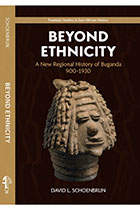
Beyond Ethnicity? A New Regional History of Buganda, 900 to 1930. (Kampala: Fountain Publishers, 2024) by David L. Schoenbrun.
Read the book flyer here.
2023
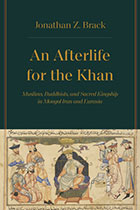 An Afterlife of the Khan: Muslims, Buddhists, and Sacred Kingship in Mongol Iran and Eurasia (University of California Press, 2023) by Jonathan Brack.
An Afterlife of the Khan: Muslims, Buddhists, and Sacred Kingship in Mongol Iran and Eurasia (University of California Press, 2023) by Jonathan Brack.
In the Mongol Empire, the interfaith court provided a contested arena for a performance of the Mongol ruler’s sacred kingship, and the debate was fiercely ideological and religious. At the court of the newly established Ilkhanate, Muslim administrators, Buddhist monks, and Christian clergy all attempted to sway their imperial overlords, arguing fiercely over the proper role of the king and his government, with momentous and far-reaching consequences.
Focusing on the famous but understudied figure of the grand vizier Rashid al-Din, a Persian Jew who converted to Islam, Jonathan Z. Brack explores the myriad ways Rashid al-Din and his fellow courtiers investigated, reformulated, and transformed long-standing ideas of authority and power. Out of this intellectual ferment of accommodation, resistance, and experimentation, they developed a completely new understanding of sacred kingship. This new ideal, and the political theology it subtends, would go on to become a central justification in imperial projects across Eurasia in the centuries that followed. An Afterlife for the Khan offers a powerful cultural and intellectual history of this pivotal moment for Islam and empire in the Middle East and Asia.
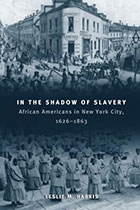 In the Shadow of Slavery : African Americans in New York City, 1626-1863. New edition, enlarged (University of Chicago Press, 2023) by Leslie M. Harris.
In the Shadow of Slavery : African Americans in New York City, 1626-1863. New edition, enlarged (University of Chicago Press, 2023) by Leslie M. Harris.
In the Shadow of Slavery reveals the history of African Americans in the nation’s largest metropolis, New York City. Leslie M. Harris draws on travel accounts, autobiographies, newspapers, literature, and organizational records to extend prior studies of racial discrimination. She traces the undeniable impact of African Americans on class distinctions, politics, and community formation by offering vivid portraits of the lives and aspirations of countless black New Yorkers. This new edition includes an afterword by the author addressing subsequent research and the ongoing arguments over how slavery and its legacy should be taught, memorialized, and acknowledged by governments.
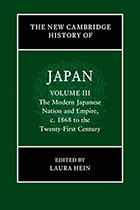 The Modern Japanese Nation and Empire, Cambridge History of Japan vol 3 (Cambridge UP, 2023) by Laura Hein.
The Modern Japanese Nation and Empire, Cambridge History of Japan vol 3 (Cambridge UP, 2023) by Laura Hein.
This major new volume presents innovative recent scholarship on Japan's modern history, including its imperial past and transregional entanglements. An international team of leading scholars offer accessible and thought-provoking essays that present an expansive global vision of the archipelago's history from c. 1868 to the twenty-first century. Japan was the first non-Western society to become a modern nation and empire, to industrialize, and to deliver a high standard of living to virtually all its citizens, capturing international attention ever since. These Japanese efforts to reshape global hierarchies powered a variety of debates and conflicts, both at home and with people and places beyond Japan's shores. Drawing on the latest Japanese and English-language scholarship, this volume highlights Japan's distinctive and fast-changing history.
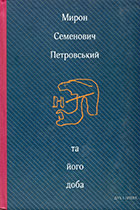 Co-editor with Mikhail Nazaerenko and Yulia Veretennikova of Miron Petrovsky and his Epoch (Kyiv: Dukh i Litera, 2023), [in Russian and Ukrainian], Yohanan Petrovsky-Shtern.
Co-editor with Mikhail Nazaerenko and Yulia Veretennikova of Miron Petrovsky and his Epoch (Kyiv: Dukh i Litera, 2023), [in Russian and Ukrainian], Yohanan Petrovsky-Shtern.
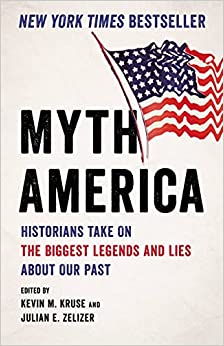 Myth America by Kevin M. Kruse and Julian E. Zelizer (Basic Books, 2023) - Essays by Kathleen Belew, Geraldo Cadava, and Daniel Immerwahr.
Myth America by Kevin M. Kruse and Julian E. Zelizer (Basic Books, 2023) - Essays by Kathleen Belew, Geraldo Cadava, and Daniel Immerwahr.In Myth America, Kevin M. Kruse and Julian E. Zelizer have assembled an all-star team of fellow historians to push back against this misinformation. The contributors debunk narratives that portray the New Deal and Great Society as failures, immigrants as hostile invaders, and feminists as anti-family warriors—among numerous other partisan lies. Based on a firm foundation of historical scholarship, their findings revitalize our understanding of American history ... Read more.
2022
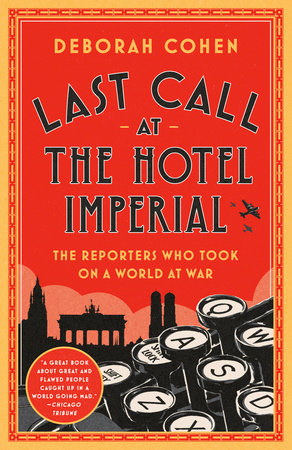
Last Call at the Hotel Imperial: The Reporters Who Took on a World at War (Random House and William Collins, 2022) by Deborah Cohen.
The extraordinary story of John Gunther, H. R. Knickerbocker, Vincent Sheean, and Dorothy Thompson. In those tumultuous years, they landed exclusive interviews with Hitler and Mussolini, Nehru and Gandhi, and helped shape what Americans knew about the world. Alongside these backstage glimpses into the halls of power, they left another equally incredible set of records.
Living in the heady afterglow of Freud, they subjected themselves to frank, critical scrutiny and argued about love, war, sex, death, and everything in between ... Read more.
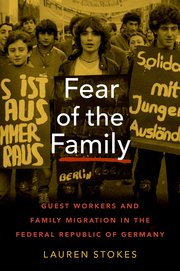
Fear of the Family: Guest Workers and Family Migration in the Federal Republic of Germany (Oxford University Press, 2022) by Lauren Stokes.
Beginning in 1955, West Germany recruited millions of people as guest workers from Yugoslavia, Italy, Greece, Spain, Portugal, and especially Turkey. This labor force was essential to creating the postwar German economic miracle. Employers fantasized that foreign "guest workers" would provide labor power in their prime productive years without having to pay for their education, pensions, or medical care. They especially hoped that the workers would leave behind their spouses and children and not encumber the German state or society with the cost of caring for them ... Read more.
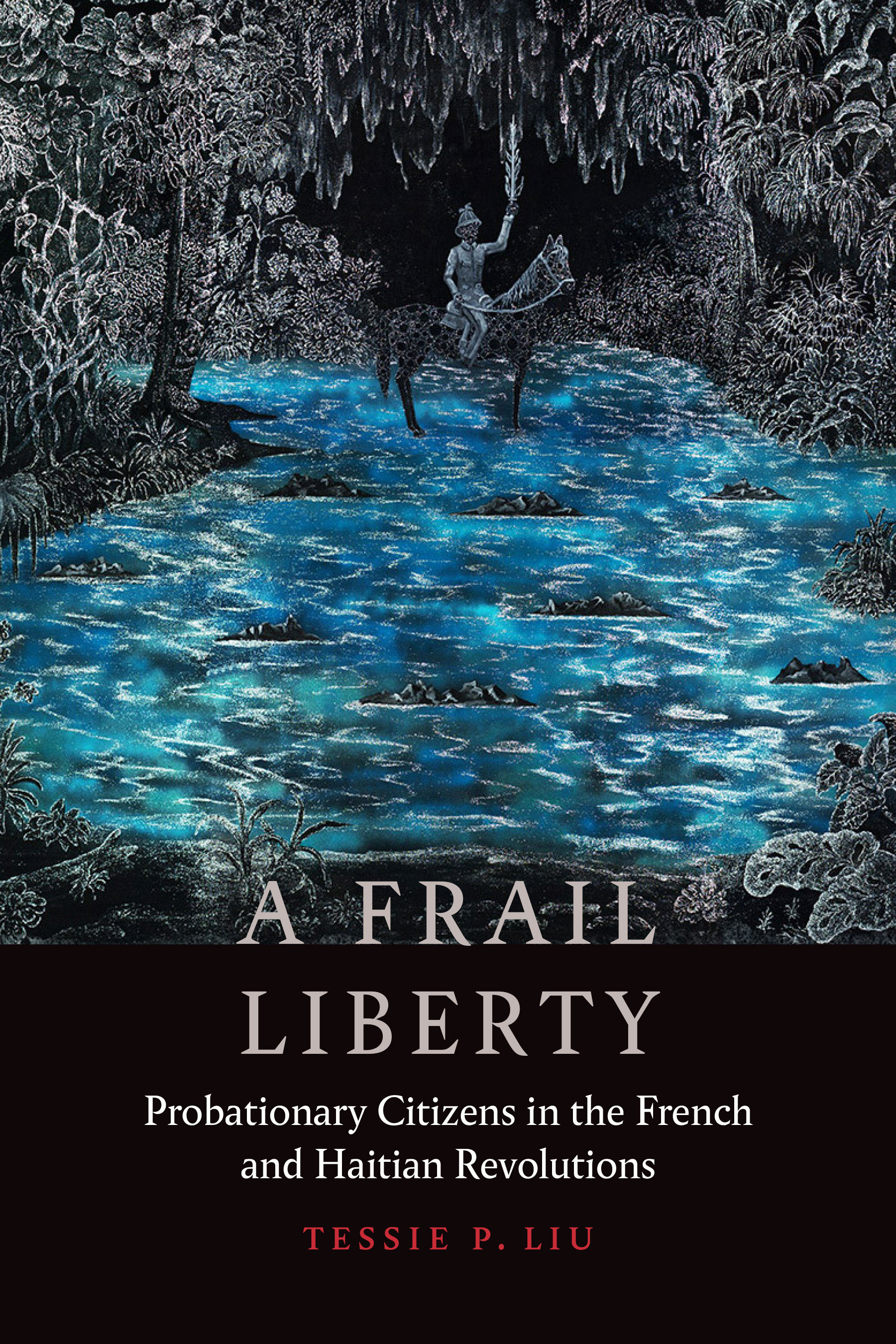 A Frail Liberty: Probationary Citizens in the French and Haitian Revolutions (Nebraska, 2022) by Tessie Liu.
A Frail Liberty: Probationary Citizens in the French and Haitian Revolutions (Nebraska, 2022) by Tessie Liu.A Frail Liberty traces the paradoxical actions of the first French abolitionist society, the Société des Amis des Noirs (Society of the Friends of Blacks), at the juncture of two unprecedented achievements of the revolutionary era: the extension of full rights of citizenship to qualifying free men of color in 1792 and the emancipation decree of 1794 that simultaneously declared the formerly enslaved to be citizens of France. This society helped form the revolution’s notion of color-blind equality yet did not protest the pro-slavery attack on the new citizens of France. Tessie P. Liu prioritizes the understanding of the elite insiders’ vision of equality as crucial to understanding this dualism ... Read more.
 The Jewish Architectural Legacy of Lviv (Lviv: The Old Lion Publishing House, 2022). Co-edited by Professor Yohanan Petrovsky-Shtern.
The Jewish Architectural Legacy of Lviv (Lviv: The Old Lion Publishing House, 2022). Co-edited by Professor Yohanan Petrovsky-Shtern.Issued by the leading Ukrainian “Old Lion” Publishing House, the monograph The Jewish Architectural Legacy of Lviv is the first comprehensive study of the 600-year long history of the Jews in Lviv, presented through the prism of urban development. Written as a monographic catalogue, this book outlines the contribution of Jewish architects to the urban expansion of Lviv and its financial, institutional, socio-economic, and cultural growth. The book portrays how Jews built their communal presence in Lviv through the construction of synagogues of various Judaic denominations and how Jewish elites participated in the modernization of the urban space by establishing communal, social relief, and educational organizations and by commissioning important Jewish and Christian architects to design their institutions ... Read more.
The Mamluk Sultanate ruled Egypt, Syria and the Arabian hinterland along the Red Sea. Lasting from the deposition of the Ayyubid dynasty (c. 1250) to the Ottoman conquest of Egypt in 1517, this regime of slave-soldiers incorporated many of the political structures and cultural traditions of its Fatimid and Ayyubid predecessors. Yet its system of governance and centralisation of authority represented radical departures from the hierarchies of power that predated it. Providing a rich and comprehensive survey of events from the Sultanate's founding to the Ottoman occupation, this interdisciplinary book explores the Sultanate's identity and heritage after the Mongol conquests, the expedience of conspiratorial politics, and the close symbiosis of the military elite and civil bureaucracy ... Read more.
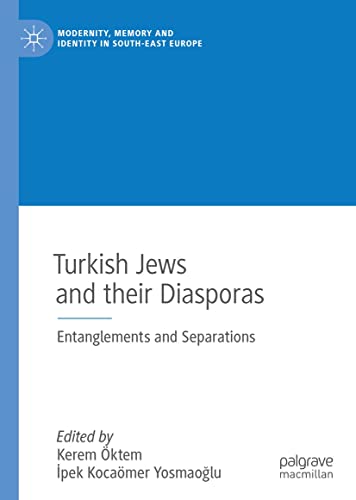 Turkish Jews and their Diasporas: Entanglements and Separations (Palgrave Macmillan, 2022) by Co-editor Ipek Yosmaoglu.
Turkish Jews and their Diasporas: Entanglements and Separations (Palgrave Macmillan, 2022) by Co-editor Ipek Yosmaoglu.This book introduces the reader to the past and present of Jewish life in Turkey and to Turkish Jewish diaspora communities in Israel, Europe, Latin America and the United States. It surveys the history of Jews in the Ottoman Empire and the Turkish Republic, examining the survival of Jewish communities during the dissolution of the empire and their emigration to America, Europe, and Israel. In the cases discussed, members of these communities often sought and seek close connections with Turkey, even if those ‘ties that bind’ are rarely reciprocated by Turkish governments. Contributors also explore Turkish Jewishness today, as it is lived in Israel and Turkey, and as found in ‘places of memory’ in many cities in Turkey, where Jews no longer exist today ... Read more.
2021
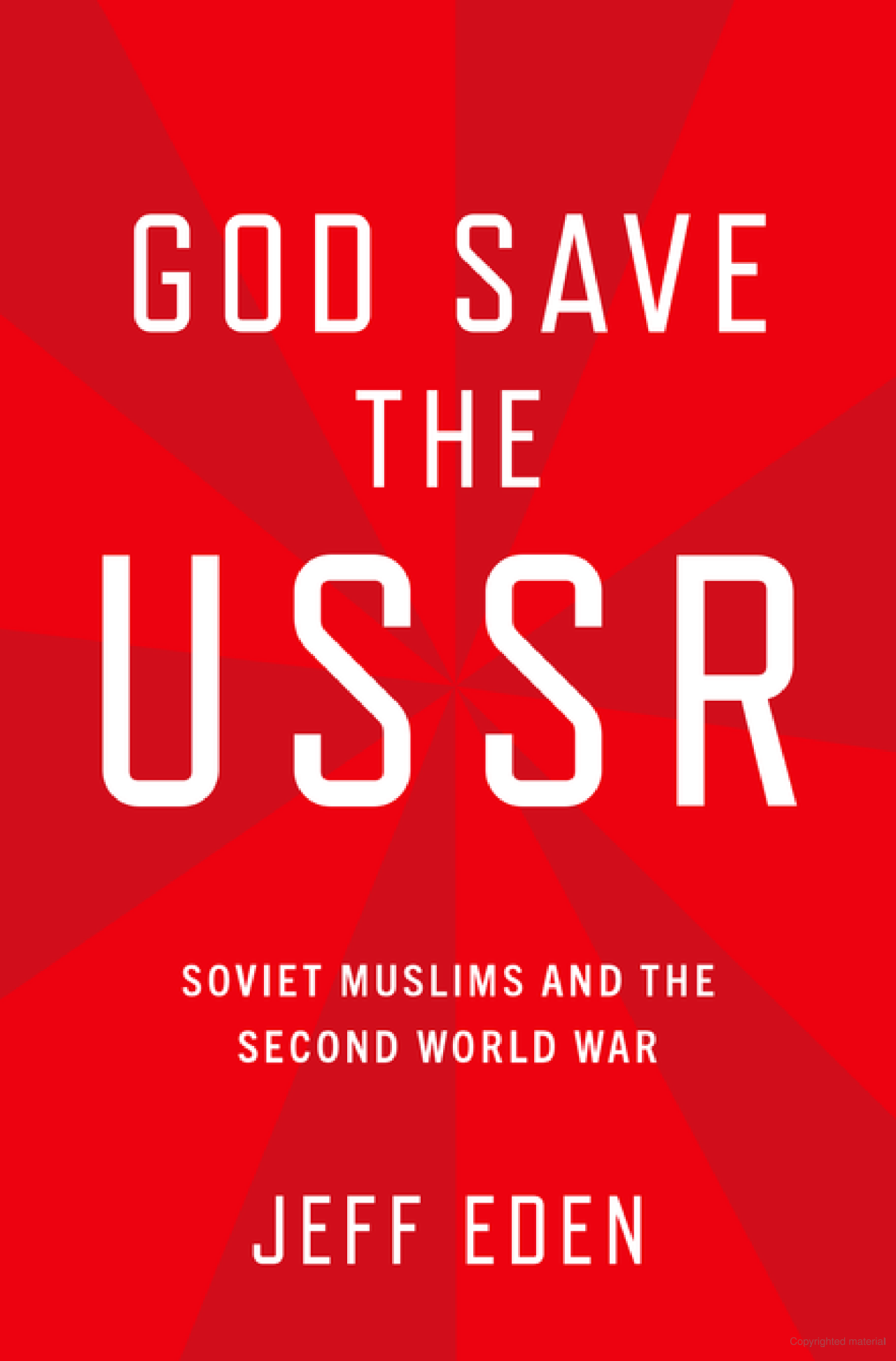 God Save the USSR: Soviet Muslims and the Second World War by Jeff Eden (New York: Oxford University Press, 2021).
God Save the USSR: Soviet Muslims and the Second World War by Jeff Eden (New York: Oxford University Press, 2021).During the Second World War, as the Soviet Red Army was locked in brutal combat against the Nazis, Joseph Stalin ended the state's violent, decades-long persecution of religion. In a stunning reversal, priests, imams, rabbis, and other religious elites--many of them newly-released from the Gulag--were tasked with rallying Soviet citizens to a "Holy War" against Hitler. To the delight of some citizens, and to the horror of others ... Read more.
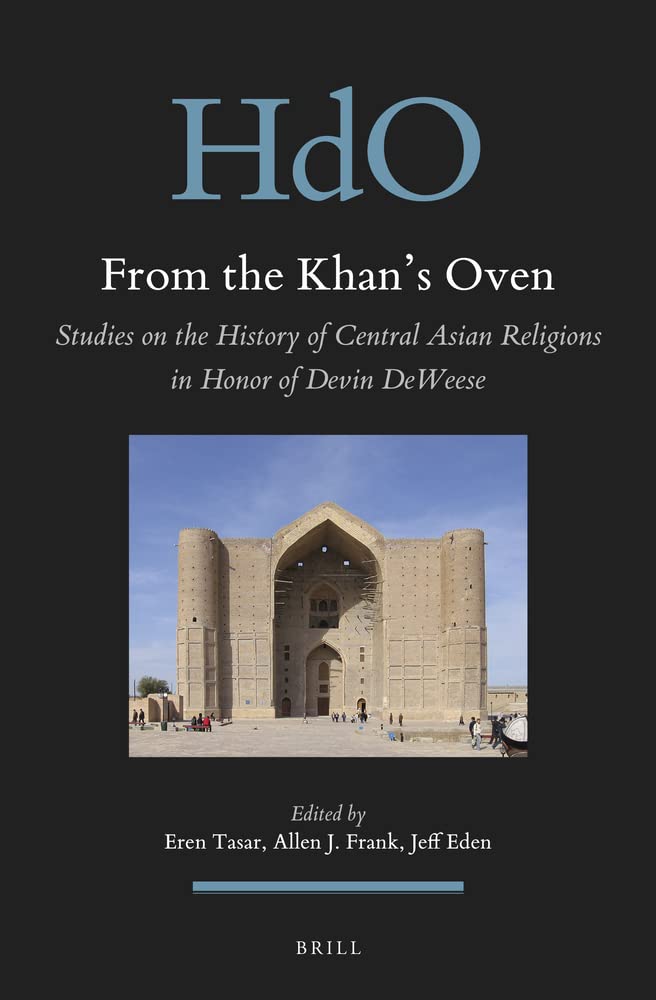
From the Khan's Oven by Jeff Eden (Brill, 2021).
The volume’s focus is thus twofold: to bring a new set of rich, largely unused materials into the scholarly domain among specialists on Central Asia, and to challenge historians of Islam to recognize that understanding the religious history of Central Asia, and Sufism in particular, is crucial in evaluating the Islamic world as a whole ... Read more.
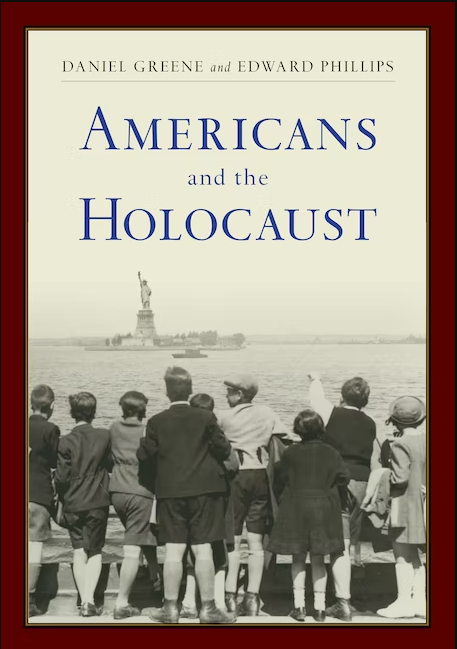
Americans and the Holocaust Edited by Daniel Greene, Edward Phillips (Rutgers University Press, 2021).
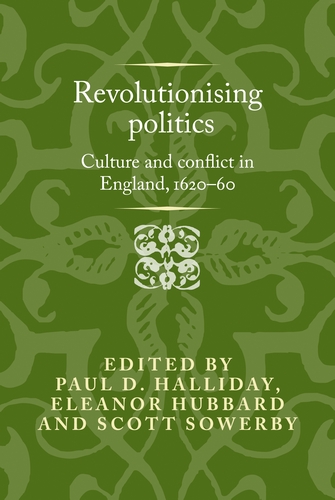 Revolutionizing politics: Culture and conflict in England, 1620–60 Edited by Paul D. Halliday, Eleanor Hubbard, and Scott Sowerby (Manchester University Press, 2021).
Revolutionizing politics: Culture and conflict in England, 1620–60 Edited by Paul D. Halliday, Eleanor Hubbard, and Scott Sowerby (Manchester University Press, 2021).
In this fascinating collection, twelve colleagues of the late Mark Kishlansky come together to reconsider the meanings of England’s mid-seventeenth-century revolution. Their chapters range widely: from shipboard to urban conflicts; from court sermons to local finances; from debates over hairstyles to debates over the meanings of regicide; from courtrooms to pamphlet wars; and from religious rights to human rights. Taken together, they indicate how we might improve our understanding of a turbulent epoch in political history by approaching it more modestly and quietly than historians of recent decades have often done. Revolutionizing politics will appeal to professional historians and their students interested in the social, cultural, religious and legal history of seventeenth-century English politics. Specific chapters will interest scholars in book history, the cultural history of politics and the history of political, civil and human rights ... Read more.
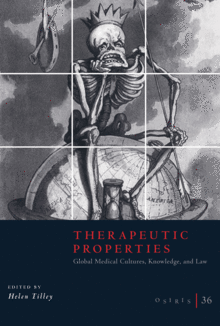
Osiris, Volume 36
Therapeutic Properties: Global Medical Cultures, Knowledge, and Law Edited by Helen Tilley (The University of Chicago Press, 2021).
This volume of Osiris takes as its point of departure a simple premise: we have yet to fully flesh out the complex historical interplay between medicine and law across the globe. Therapeutic Properties takes an inventive look at the issue, presenting welcome insights on the worldwide ascendancy of biomedicine, the persistence of nonofficial and unorthodox approaches to healing, and the legal contexts that have served to shape these dynamics. The contributions draw upon source material from the Americas, Africa, Western Europe, the Caribbean, and Asia to trace the influence of penal and civil codes, courts and constitutions, and patents and intellectual properties on not only health practices but also the very foundations of state-sanctioned medicine ... Read more.
From Improvement to City Planning emphasizes the ways people in nineteenth-century America managed urban growth. Historian Henry Binford shows how efforts to improve space were entwined with the evolution of urban governance (i.e., regulation)—and also influenced by a small group of advantaged families.
Binford looks specifically at Cincinnati, Ohio, then the largest and most important interior city west of the Appalachian Mountains. He shows that it was not just industrialization, but also beliefs about morality, race, health, poverty, and “slum” environments, that demanded an improvement of urban space ... Read more.
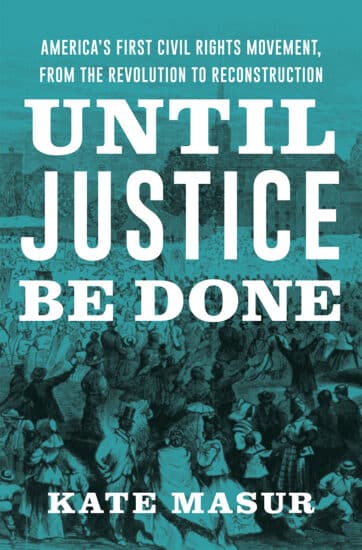 Until Justice Be Done: America's First Civil Rights Movement, from the Revolution to Reconstruction by Kate Masur (W. W. Norton & Company, 2021).
Until Justice Be Done: America's First Civil Rights Movement, from the Revolution to Reconstruction by Kate Masur (W. W. Norton & Company, 2021).
A groundbreaking history of the movement for equal rights that courageously battled racist laws and institutions, Northern and Southern, in the decades before the Civil War.
The half-century before the Civil War was beset with conflict over equality as well as freedom. Beginning in 1803, many free states enacted laws that discouraged free African Americans from settling within their boundaries and restricted their rights to testify in court, move freely from place to place, work, vote, and attend public school. But over time, African American activists and their white allies, often facing mob violence, courageously built a movement to fight these racist laws ... Read more.
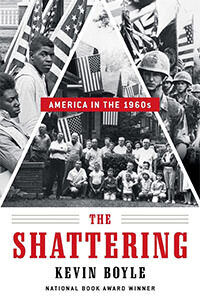
The Shattering: America in the 1960s by Kevin Boyle (W. W. Norton & Company, 2021).
On July 4, 1961, the rising middle-class families of a Chicago neighborhood gathered before their flag-bedecked houses, a confident vision of the American Dream. That vision was shattered over the following decade, its inequities at home and arrogance abroad challenged by powerful civil rights and antiwar movements. Assassinations, social violence, and the blowback of a “silent majority” shredded the American fabric ... Read more.
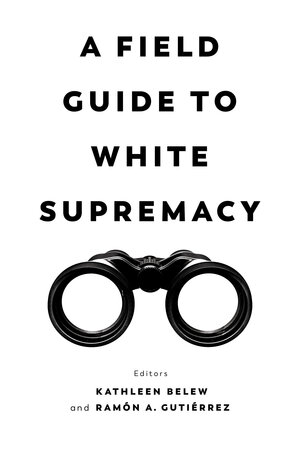
A Field Guide to White Supremacy Edited by Kathleen Belew and Ramon A. Gutierrez (University of California Press, 2021).
Hate, racial violence, exclusion, and racist laws receive breathless media coverage, but such attention focuses on distinct events that gain our attention for twenty-four hours. The events are presented as episodic one-offs, unfortunate but uncanny exceptions perpetrated by lone wolves, extremists, or individuals suffering from mental illness—and then the news cycle moves on. If we turn to scholars and historians for background and answers, we often find their knowledge siloed in distinct academic subfields, rarely connecting current events with legal histories, nativist insurgencies, or centuries of misogynist, anti-Black, anti-Latino, anti-Asian, and xenophobic violence. But recent hateful actions are deeply connected to the past—joined not only by common perpetrators, but by the vast complex of systems, histories, ideologies, and personal beliefs that comprise white supremacy in the United States ... Read more.
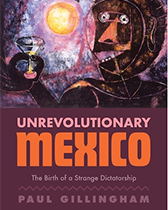
Unrevolutionary Mexico: The Birth of a Strange Dictatorship by Paul Gillingham (Yale University Press, 2021).
In this book Paul Gillingham addresses how the Mexican Revolution (1910–1940) gave way to a capitalist dictatorship of exceptional resilience, where a single party ruled for seventy-one years. Yet while soldiers seized power across the rest of Latin America, in Mexico it was civilians who formed governments, moving punctiliously in and out of office through uninterrupted elections ... Read more.
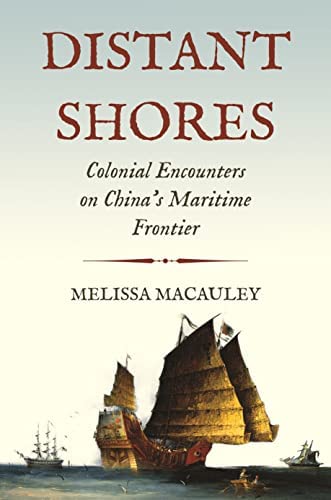
Distant Shores: Colonial Encounters on China's Maritime Frontier by Melissa Macauley (Princeton University Press, 2021).
China has conventionally been considered a land empire whose lack of maritime and colonial reach contributed to its economic decline after the mid-eighteenth century. Distant Shores challenges this view, showing that the economic expansion of southeastern Chinese rivaled the colonial ambitions of Europeans overseas. In a story that dawns with the Industrial Revolution and culminates in the Great Depression, Melissa Macauley explains how sojourners from an ungovernable corner of China emerged among the commercial masters of the South China Sea. She focuses on ... Read more.
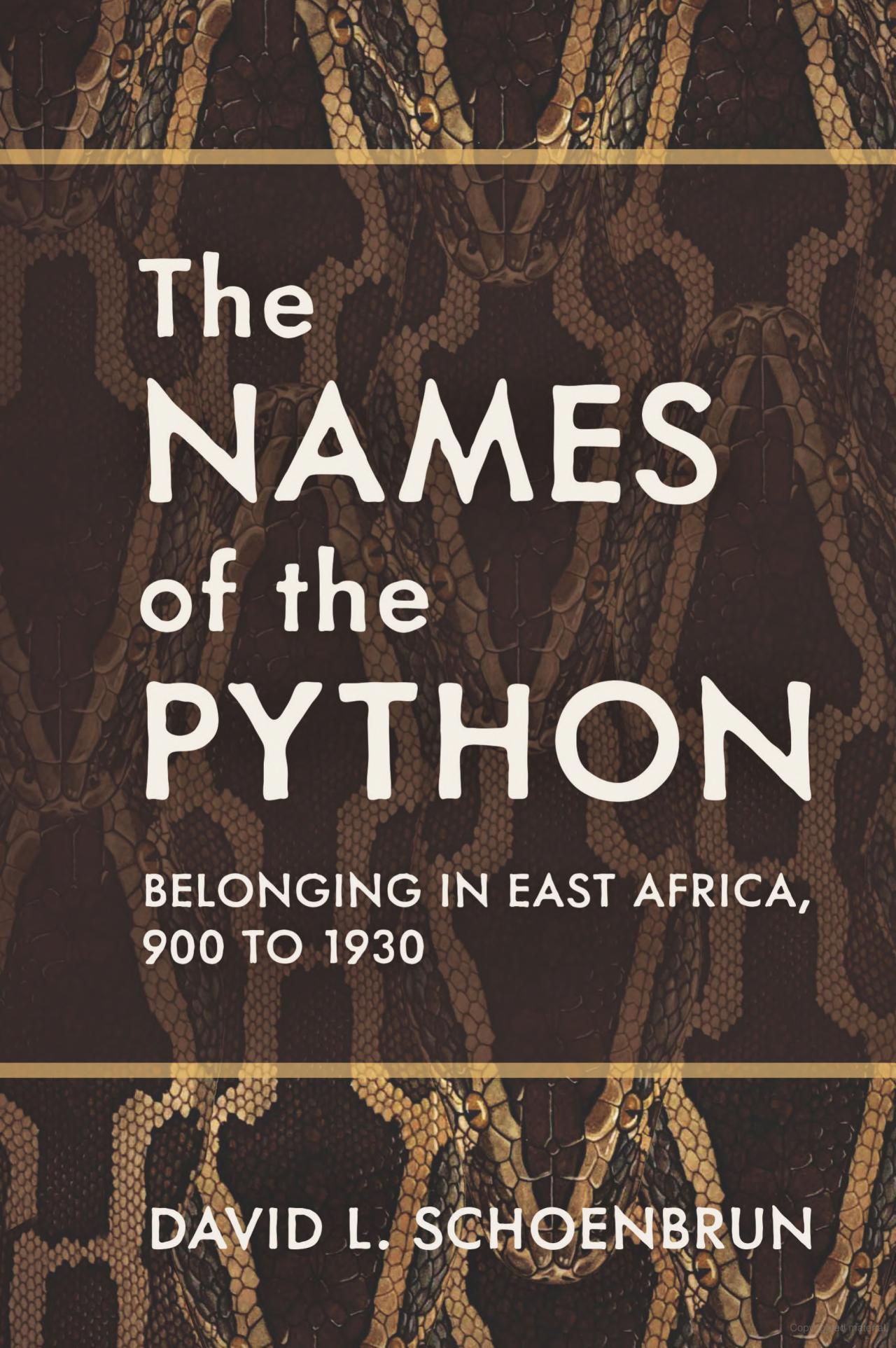
The Names of the Python: Belonging in East Africa, 900 to 1930 by David L. Schoenbrun (University of Wisconsin Press, 2021).
Systems of belonging, including ethnicity, are not static, automatic, or free of contest. Historical contexts shape the ways which we are included in or excluded from specific classifications. Building on an amazing array of sources, David L. Schoenbrun examines groupwork—the imaginative labor that people do to constitute themselves as communities—in an iconic and influential region in East Africa. His study traces the roots of nationhood in the Ganda state over the course of a millennia, demonstrating that the earliest clans were based not on political identity or language but on shared investments, knowledges, and practices ... Read more.
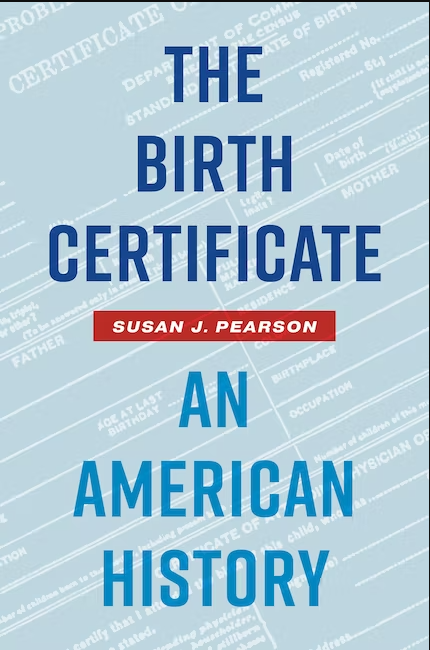
The Birth Certificate: An American History by Susan J. Pearson (The University of North Carolina Press, 2021).
Systems of belonging, including ethnicity, are not static, automatic, or free of contest. Historical contexts shape the ways which we are included in or excluded from specific classifications. Building on an amazing array of sources, David L. Schoenbrun examines groupwork—the imaginative labor that people do to constitute themselves as communities—in an iconic and influential region in East Africa. His study traces the roots of nationhood in the Ganda state over the course of a millennia, demonstrating that the earliest clans were based not on political identity or language but on shared investments, knowledges, and practices ... Read more.
2020

Stranger in the Shogun's City: A Japanese Woman and Her World by Amy Stanley (Scribner, 2020).
A vivid, deeply researched work of history that explores the life of an unconventional woman during the first half of the 19th century in Edo—the city that would become Tokyo—and a portrait of a great city on the brink of a momentous encounter with the West. The daughter of a Buddhist priest, Tsuneno was born in a rural Japanese village and was expected to live a traditional life much like her mother’s. But after three divorces—and a temperament much too strong-willed for her family’s approval—she ran away to make a life for herself in one of the largest cities in the world: Edo, a bustling metropolis at its peak ... Read more.
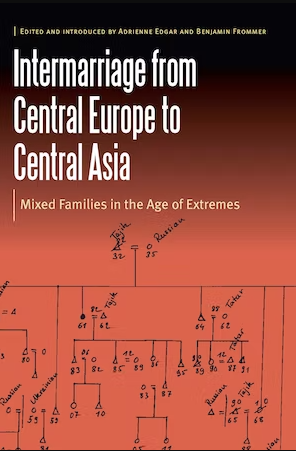
Intermarriage from Central Europe to Central Asia Edited and introduced by Adrienne Edgar and Benjamin Frommer (University of Nebraska Press, 2020).
Intermarriage from Central Europe to Central Asia examines the practice and experience of interethnic marriage in a range of countries and eras, from imperial Germany to present-day Tajikistan. In this interdisciplinary volume Adrienne Edgar and Benjamin Frommer have drawn contributions from anthropologists and historians. The contributors explore the phenomenon of intermarriage both from the top down, in the form of state policies and official categories, and from the bottom up, through an intimate look at the experience and agency of mixed families in modern states determined to control the lives and identities of their citizens to an unprecedented degree ... Read more.
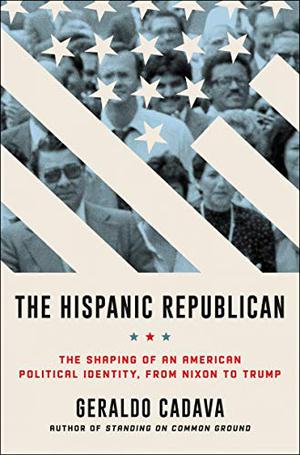 The Hispanic Republican: The Shaping of an American Political Identity, from Nixon to Trump by Geraldo Cadava (Ecco, 2020).
The Hispanic Republican: The Shaping of an American Political Identity, from Nixon to Trump by Geraldo Cadava (Ecco, 2020).In The Hispanic Republican, historian and political commentator Geraldo Cadava illuminates the history of the millions of Hispanic Republicans who, since the 1960s, have had a significant impact on national politics. Intertwining the little understood history of Hispanic Americans with a cultural study of how post–World War II Republican politicians actively courted the Hispanic vote during the Cold War (especially Cuban émigrés) and during periods of major strife in Central America (especially during Iran-Contra), Cadava offers insight into the complicated dynamic between Latino liberalism and conservatism, which, when studied together, shine a crucial light on a rapidly changing demographic that will impact American elections for years to come ... Read more.
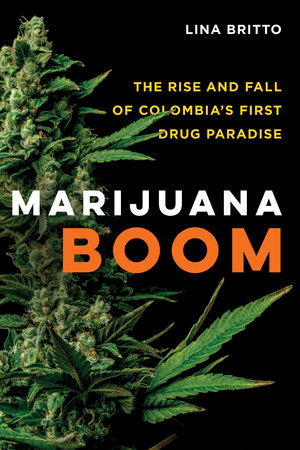
Marijuana Boom: The Rise and Fall of Colombia's First Drug Paradise
by Lina Britto (University of California Press, 2020).Before Colombia became one of the world’s largest producers of cocaine in the 1980s, traffickers from the Caribbean coast partnered with American buyers in the 1970s to make the South American country the main supplier of marijuana for a booming US drug market, fueled by the US hippie counterculture. How did Colombia become central to the creation of an international drug trafficking circuit? Marijuana Boom is the story of this forgotten history. Combining deep archival research with unprecedented oral history, Lina Britto deciphers a puzzle: Why did the Colombian coffee republic, a model of Latin American representative democracy and economic modernization, transform into a drug paradise, and at what cost? Read more.
2019
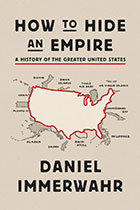
How to Hide an Empire: A History of the Greater United States by Daniel Immerwahr (Farrar, Straus and Giroux, 2019).
We are familiar with maps that outline all fifty states. And we are also familiar with the idea that the United States is an “empire,” exercising power around the world. But what about the actual territories―the islands, atolls, and archipelagos―this country has governed and inhabited? In How to Hide an Empire, Daniel Immerwahr tells the fascinating story of the United States outside the United States. In crackling, fast-paced prose, he reveals forgotten episodes that cast American history in a new light. We travel to the Guano Islands, where prospectors collected one of the nineteenth century’s most valuable commodities, and the Philippines ... Read more.
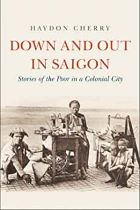
Historian Haydon Cherry offers the first comprehensive social history of the urban poor of colonial French Saigon by following the lives of six individuals—a prostitute, a Chinese laborer, a rickshaw puller, an orphan, an incurable invalid, and a destitute Frenchman—and how they navigated the ups and downs of the regional rice trade and the institutions of French colonial rule in the first half of the twentieth century ... Read more.
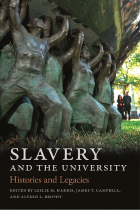
Slavery and the University is the first edited collection of scholarly essays devoted solely to the histories and legacies of this subject on North American campuses and in their Atlantic contexts. Gathering together contributions from scholars, activists, and administrators, the volume combines two broad bodies of work: (1) historically based interdisciplinary research on the presence of slavery at higher education institutions in terms of the development of proslavery and antislavery thought and the use of slave labor; and (2) analysis on the ways in which the legacies of slavery in institutions of higher education continued in the post–Civil War era to the present day ... Read more.
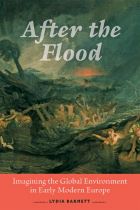
How the story of Noah's Flood was central to the development of a global environmental consciousness in early modern Europe.
Many centuries before the emergence of the scientific consensus on climate change, people began to imagine the existence of a global environment: a natural system capable of changing humans and of being changed by them. In After the Flood, Lydia Barnett traces the history of this idea back to the early modern period, when the Scientific Revolution, the Reformations, the Little Ice Age, and the overseas expansion of European empire, religion, and commerce gave rise to new ideas about nature, humanity, and their intersecting histories ... Read more.

